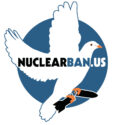As of 7/7/17, the world has changed.
The Nuclear Ban Treaty makes it unequivocal and impossible to misinterpret: nuclear weapons are unacceptable, at all times, under all circumstances, no matter who has them and no matter for what reason.
The United States itself (according to a letter sent to all NATO capitals) interprets the Treaty to mean that US planes carrying nuclear weapons will not be allowed to fly over the airspace of countries which sign the Treaty. US ships and submarines with nuclear weapons on board will not be allowed to dock in countries which have signed the Treaty. US military exercises involving the simulated use of nuclear weapons will not be allowed to take place in those countries.
Corporations, banks, pension funds and other institutions that have offices, branches, outlets, subsidiaries and suppliers in other countries will find themselves breaking the law in those countries if they continue to be involved in production – or financing the production – of nuclear weapons.
This changes the conversation about nuclear weapons. It changes how we think and talk about nuclear weapons. It changes the very basis of the conversation.
From now on, we should be talking about when not if all nuclear weapons will be eliminated from the face of the earth. We should be working backwards from the assumption that, sooner or later, the United States will sign this Treaty, and therefore that process needs to begin now.
In the new reality, the issue is not that States and Congressional Districts across the country are going to lose federal funding if nuclear weapons bases and facilities are closed. The issue is that plans need to be made now for conversion of those bases and facilities to non-nuclear purposes, and especially to addressing climate change – since that is what is going to happen.
In the new reality, the issue is not that companies are going to resist giving up the lucrative business of making nuclear weapons and financial institutions are going to resist losing investments to that lucrative industry. The issue that those companies and banks and institutions need to be planning now for a post-nuclear weapons future – since that is what is going to happen.
